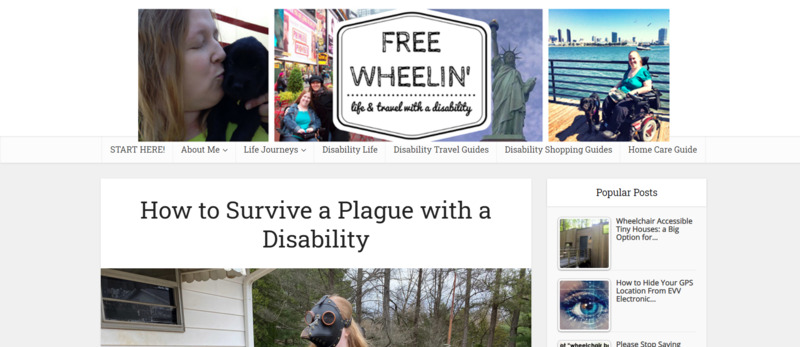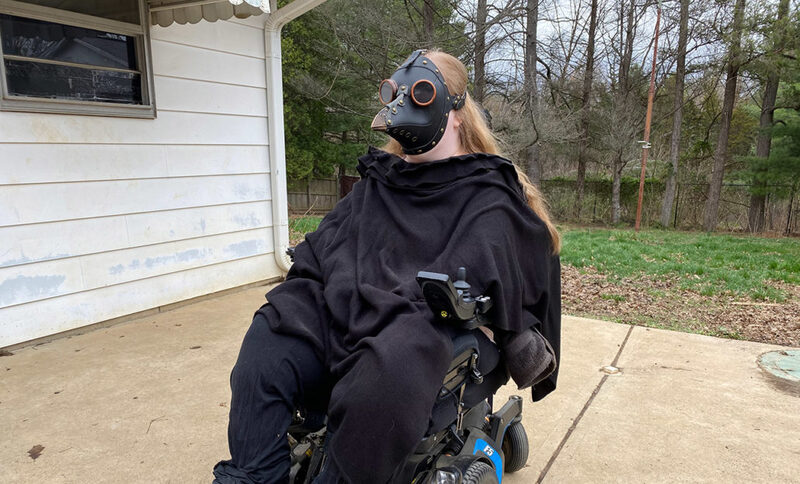Item
How to Survive a Plague with a Disability
Title (Dublin Core)
How to Survive a Plague with a Disability
Description (Dublin Core)
As I’m writing this, it is March 2021 and it’s been a year since I’ve updated this blog. Although I don’t only write about travel here, it’s been depressing to look back on my past trips and have to wonder when I could be in the world again. But I’ve been far from silent during this time. You can read many of my reflections on the pandemic and other topics over at The Mighty, where I have been an editor for the past five years.
One year ago, when the pandemic was just beginning in the United States, one of my good friends posted a social media message about supporting each other during what most people thought would be a strange, scary, but ultimately short period of our lives. Part of it went something like this:
My mask protects you. Your mask protects me.
It’s a nice sentiment. Wearing a few layers of cloth over your face may not help you much, but it helps to prevent other people from getting sick. It’s a kind, visible act we can all do to show we care during a difficult time, to protect others who are at risk even if we may think we would not become seriously ill. It seems so simple, right? How could people not do this? But we all know what happened.
“My mask protects you. Your mask protects me,” only works if the other person values your life enough to consider it worth protecting.
I’ve been horrified by the number of government officials and online commenters who have viewed the deaths of elderly and disabled people as “acceptable losses” in exchange for keeping non-essential gathering spaces open. My life, and the lives of people with high-risk conditions, are more important than your trip to Disneyland. Don’t you think we want to go to Disneyland too?
I’ve also noticed that able-bodied people often assume disabled people will be provided for in emergencies, and in general. They believe there are a lot of government programs and charities to help us, and that such programs are run well and meet our needs. This widespread — but utterly false — belief in a functioning safety net for “the vulnerable” gives people an excuse to behave selfishly while convincing themselves they’re not doing anything wrong. “Of course, there will be a plan to protect nursing home residents, and immune-suppressed people can stay home, so we can throw parties and go without masks if we don’t like them.”
In reality, the needs of people with disabilities are often disregarded, misunderstood, ignored, and even actively opposed. We have to fight for access to everything, and sometimes end up on multi-year waiting lists for housing assistance, in-home care, and other essential programs and services. We must battle with government and private insurance to get the mobility equipment we need. We are GPS tracked like criminals if we need personal care assistants, with “fraud prevention” used as an excuse. We often depend on programs with ridiculously complicated requirements, and one missed deadline, one paperwork error, one month where we made “too much money” can cost us everything.
One year ago, when the pandemic was just beginning in the United States, one of my good friends posted a social media message about supporting each other during what most people thought would be a strange, scary, but ultimately short period of our lives. Part of it went something like this:
My mask protects you. Your mask protects me.
It’s a nice sentiment. Wearing a few layers of cloth over your face may not help you much, but it helps to prevent other people from getting sick. It’s a kind, visible act we can all do to show we care during a difficult time, to protect others who are at risk even if we may think we would not become seriously ill. It seems so simple, right? How could people not do this? But we all know what happened.
“My mask protects you. Your mask protects me,” only works if the other person values your life enough to consider it worth protecting.
I’ve been horrified by the number of government officials and online commenters who have viewed the deaths of elderly and disabled people as “acceptable losses” in exchange for keeping non-essential gathering spaces open. My life, and the lives of people with high-risk conditions, are more important than your trip to Disneyland. Don’t you think we want to go to Disneyland too?
I’ve also noticed that able-bodied people often assume disabled people will be provided for in emergencies, and in general. They believe there are a lot of government programs and charities to help us, and that such programs are run well and meet our needs. This widespread — but utterly false — belief in a functioning safety net for “the vulnerable” gives people an excuse to behave selfishly while convincing themselves they’re not doing anything wrong. “Of course, there will be a plan to protect nursing home residents, and immune-suppressed people can stay home, so we can throw parties and go without masks if we don’t like them.”
In reality, the needs of people with disabilities are often disregarded, misunderstood, ignored, and even actively opposed. We have to fight for access to everything, and sometimes end up on multi-year waiting lists for housing assistance, in-home care, and other essential programs and services. We must battle with government and private insurance to get the mobility equipment we need. We are GPS tracked like criminals if we need personal care assistants, with “fraud prevention” used as an excuse. We often depend on programs with ridiculously complicated requirements, and one missed deadline, one paperwork error, one month where we made “too much money” can cost us everything.
Date (Dublin Core)
Creator (Dublin Core)
Contributor (Dublin Core)
Event Identifier (Dublin Core)
Partner (Dublin Core)
Type (Dublin Core)
blog
Link (Bibliographic Ontology)
Controlled Vocabulary (Dublin Core)
Curator's Tags (Omeka Classic)
Contributor's Tags (a true folksonomy) (Friend of a Friend)
Collection (Dublin Core)
Linked Data (Dublin Core)
Date Submitted (Dublin Core)
04/22/2021
Date Modified (Dublin Core)
05/14/2021
08/04/2021
04/22/2022
08/02/2022
09/07/2024
Item sets
This item was submitted on April 22, 2021 by Dana Bell using the form “Share Your Story” on the site “A Journal of the Plague Year”: https://covid-19archive.org/s/archive
Click here to view the collected data.


